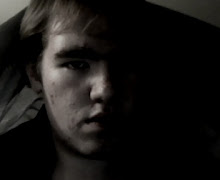
Okay. Who is Jonathan Franzen?
Not like who is he as in "Who is he in the public's mind?" That I know. We all know him as the somewhat uptight author of the bestseller of the pre-9/11 eerily accurate Bush-era novel The Corrections. Unlike Updike, the similarly themed malaise-of-suburbia writer, Franzen has the persona of a real jerk. Updike, purveyor of culture high and low, was known as a jolly, happy Pennsylvania boy with a serious side. Franzen is the lonely, self-obsessed and uncomfortable author trapped in the city, peering with contempt into the suburban life. How did he get this image?
Well, that's a long story.
With the release of his new novel, Freedom (which I am currently looking forward to reading--I have my copy stashed away where no one can get it), a slew of media has been dedicated to this man and his reputation and all of the usual stories are being played out again. The "Oprah" snub--a lose/lose situation if ever there was one. Whether he snubbed her or she snubbed him doesn't really matter anymore, considering that her show is going off the air soon.
So why bring it up every story? It's a good way to fill in a few extra columns.
Indeed, in the Time magazine story (the first time in, what, ten, fifteen years that a writer has been on the cover of Time?) includes semi-juicy gossip on this particular angle. I preferred when they described his writing room. Even the pictures (gray-scale and amazingly bland) were more interesting and probably had more to do with the book than yet another "Oprah" moment.
What are the reviews saying? They seem to be reviewing his persona more often than they are reviewing the book--a rookie mistake if ever there was one. The novel is compared with his last, shining glory, The Corrections. No one says if it's a step up from his awful, awful non-fiction works, The Discomfort Zone (which I dare everyone to try and read without becoming frustrated and throwing the book across the room) and the self-righteous essay collection How to be Alone. (Remember, "Alone" is the key word.)
Even by looking at Franzen's non-fiction (stuff that [I would assume] he's had the final "OK" on), we still don't know who he is. Excluding the media-image on the man doesn't help. The "Franzen Character" that Franzen presents to the media is, perhaps intentionally or unintentionally, a real snot, a jerk. I'm sure he doesn't intend it to come off that way, but that's the way he is received, none the less. Perhaps the media image of himself has become the way he views himself, which would be a sad thing. However, it might just be that he's presenting himself as this kind of know-it-all just for the sake of having people say things like, "He's a total jerk, but man can he write good fiction!"
JPC
Not like who is he as in "Who is he in the public's mind?" That I know. We all know him as the somewhat uptight author of the bestseller of the pre-9/11 eerily accurate Bush-era novel The Corrections. Unlike Updike, the similarly themed malaise-of-suburbia writer, Franzen has the persona of a real jerk. Updike, purveyor of culture high and low, was known as a jolly, happy Pennsylvania boy with a serious side. Franzen is the lonely, self-obsessed and uncomfortable author trapped in the city, peering with contempt into the suburban life. How did he get this image?
Well, that's a long story.
With the release of his new novel, Freedom (which I am currently looking forward to reading--I have my copy stashed away where no one can get it), a slew of media has been dedicated to this man and his reputation and all of the usual stories are being played out again. The "Oprah" snub--a lose/lose situation if ever there was one. Whether he snubbed her or she snubbed him doesn't really matter anymore, considering that her show is going off the air soon.
So why bring it up every story? It's a good way to fill in a few extra columns.
Indeed, in the Time magazine story (the first time in, what, ten, fifteen years that a writer has been on the cover of Time?) includes semi-juicy gossip on this particular angle. I preferred when they described his writing room. Even the pictures (gray-scale and amazingly bland) were more interesting and probably had more to do with the book than yet another "Oprah" moment.
What are the reviews saying? They seem to be reviewing his persona more often than they are reviewing the book--a rookie mistake if ever there was one. The novel is compared with his last, shining glory, The Corrections. No one says if it's a step up from his awful, awful non-fiction works, The Discomfort Zone (which I dare everyone to try and read without becoming frustrated and throwing the book across the room) and the self-righteous essay collection How to be Alone. (Remember, "Alone" is the key word.)
Even by looking at Franzen's non-fiction (stuff that [I would assume] he's had the final "OK" on), we still don't know who he is. Excluding the media-image on the man doesn't help. The "Franzen Character" that Franzen presents to the media is, perhaps intentionally or unintentionally, a real snot, a jerk. I'm sure he doesn't intend it to come off that way, but that's the way he is received, none the less. Perhaps the media image of himself has become the way he views himself, which would be a sad thing. However, it might just be that he's presenting himself as this kind of know-it-all just for the sake of having people say things like, "He's a total jerk, but man can he write good fiction!"
JPC


No comments:
Post a Comment